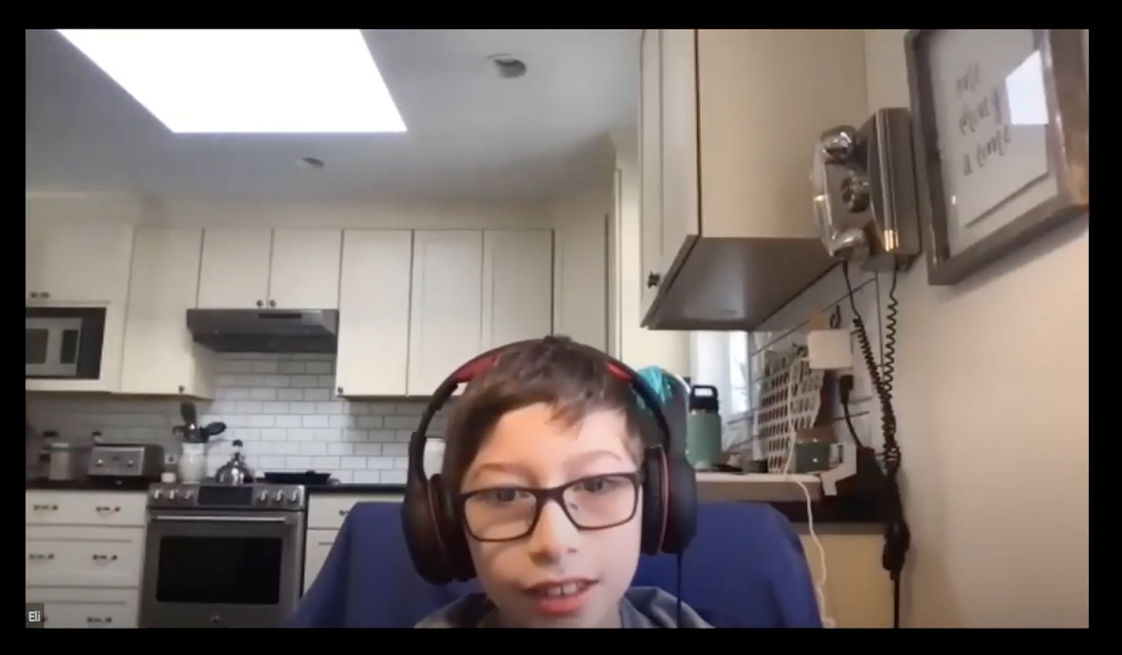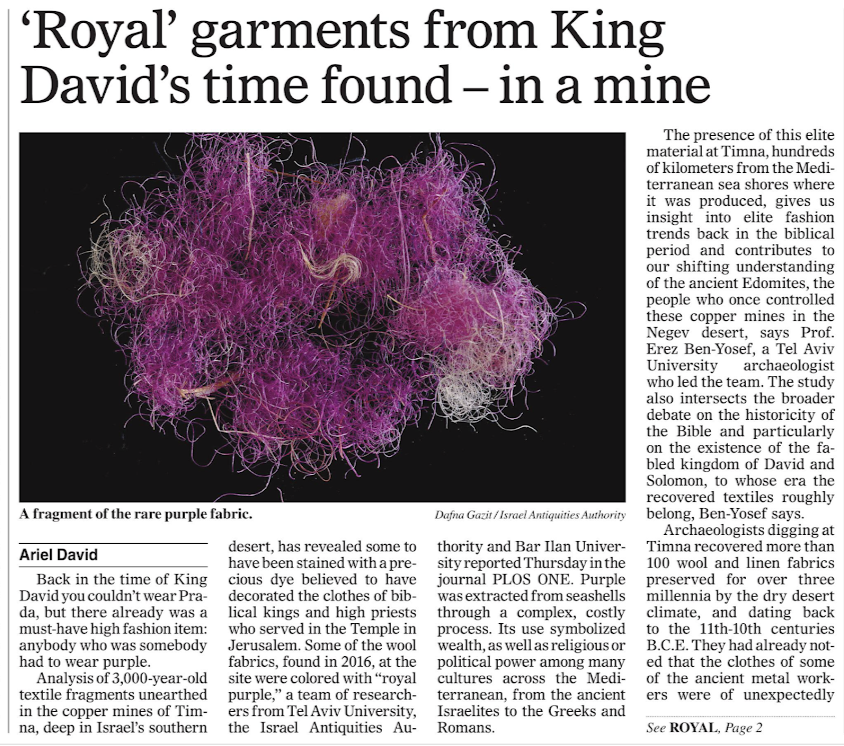In This Moment
Shabbat-O-Gram, January 29, 2021
Scenes from Tu B'Shevat...
| Tu B'Shevat Adult Seder |
| Tu B'Shevat Family Seder |






This week is Shabbat Shira (the Sabbath of Song), when we read the portion Beshallach, featuring the crossing of the Red Sea. Here's a unique midrash on that Red Sea passage, from Manga Mutiny, a Biblically-accurate retelling of Genesis through Exodus 15:27 presented in the authentic Japanese Manga style.
(Thank you to Ethan H for sharing this - and happy birthday next week!)

See the bottom of this email to find out what happens!
Shabbat Shalom!
We begin with some sad news. The name Gene Wendell probably does not ring a bell to most of you, but he has a special place in many of your homes. You see, Gene, who passed away this week, has been engraving kiddush cups for TBE B'nai Mitzvah for 67 years. That means that if you are 80 years old or younger, and your Bar/Bat Mitzvah was here, that kiddush cup that you use on Friday nights or Pesach, or had under your huppah, or that just gleams proudly from your mantle - well, it was lovingly engraved by Gene.
He took the job very seriously, although there were times (many) when he would knock on my office door just before Shabbat, right under the wire, to deliver the goods. He always had a question about Judaism or a story to share - about his involvement at his synagogue in Norwalk or other things going on in his life. You can read his obituary here.
I'll miss Gene. I'll think of him every time I lift one of "his" cups under a huppah. There's a lesson here for us. Behind every treasure you own, every book, every car, every piece of jewelry, every hand-made bagel - everything - there is a Gene Wendell. Often many of them. You will never see most of these faces, but they are connected to us in the deepest possible manner.
This Shabbat, let's raise our glasses - our cups - to Eugene Wendell. In fact, if you are coming to Friday night services, bring your TBE cup with you, we'll lift them all together, and I'll send the photo to Sue, his wife.
On to other matters of great urgency....
- These days, it seems like the forces of hope and despair are engaged in an all-out war, especially regarding Covid-19. Israel is being touted for being way ahead of the curve regarding vaccinations, yet as the chart below shows, the crisis of infections is not abating.

You would think that with so many having been vaccinated the infection rate would be going down much more. In his weekly newsletter, Marc Shulman looks into these sobering trends. Meanwhile, if you are looking for an uplifting moment, yo've got to listen to this new "We are the World" style song created by Israel's most popular musicians (thank you to Aviva Maller for sharing):
- Remember when I spoke on Rosh Hashanah about the regal nature of the color purple and how it connects to the ancient history of the Israelites and the Curse (and Blessing) of Canaan, as well as the African American experience?
Well this week sent us major news on that front, an unprecedented archaeological discovery:

Ancient cloths with royal purple dye found in Israel, dated to King David's time (Times of Israel) This is a big deal. Israeli researchers have found three textile scraps near the southern tip of Israel colored with the biblically described "argaman" royal purple dye, and dated them to circa 1,000 BCE - the era of King David. The earliest ever such finds in this region, the vibrant cloths add tangible weight, in particular, to the Bible's account of an Edomite kingdom in the area at that time.
Here's the front page story in today's Ha'aretz:

More recommended reading....
- Reform Jewish Institutions Affirm IHRA Working Definition of Antisemitism -
The challenges posed by rising antisemitism are so great that we need all people of good will to join in the fight against it.
- Over 1100 Jewish clergy from around the country have come together to impress upon the Biden Administration and 117th Congress the urgency of addressing the rights and safety of refugees and asylum seekers. Here's the letter - I'm proud to have signed it.
- I'll be moderating a panel discussion on Climate Change next Thursday. An in-depth conversation with national leaders, the Rev. Lennox Yearwood, founder of Hip Hop Caucus, and Dr. Katherine Hayhoe, a leading climate scientist. The event is co-hosted by the Hartford Seminary and the Interreligious Eco-Justice Network. This paragraph from an op-ed from the NYT, "Let's Say Goodbye to Normal," by Roy Scranton, was particularly alarming.

- Our growing partnership with the Black community, and in particular members of Union Baptist Church, has borne tremendous fruit - last week's shared cooking experience was just another example. SAVE THE DATE of Feb. 21 at 5:30 PM for a panel discussion involving the two congregations, along with the AJC, JCC and others from the community. The focus will be the film, "Shared Legacies: The African American-Jewish Civil Rights Alliance. See the trailer here. This groundbreaking film will be made available for viewing before the program.
- If you missed my talk last night on Jewish views on "The Good Life," as part of the Interfaith Council's Midwinter Theological Seminar, here's the Zoom video:
- Another save-the-date. We are doing another Zoom Seder, this time on the second night of Passover, Sunday evening, March 28.
Jew By (Whose) Choice
I was fascinated by a story shared by Forward editor (and former Hoffman lecturer) Jodi Roduren, who wrote in her weekly email about an awkward moment that recently occurred. The Forward wanted to honor Kamala Harris's blended Jewish family, and in particular her 22-year old stepdaughter Ella Emhoff, only to discover that she is not Jewish.
Wait, what?
Didn't she come up with the name "Momela" for her step-mom? Isn't her dad being called the unofficial "Second Mensch?" Perhaps we should have understood the subtle difference between "Momela" and the more Jew-ish "Mamela."
According to Ella's spokesperson Joseph David Viola, "Ella is not Jewish."Ella's dad has been "celebrating Judaism for a few years now but out of an independent search," and Ella was living on her own in New York during this period. "It's not something she grew up with," he explained. "Ella truly has no qualms with the faith, but she does not want to speak on behalf of Judaism, as she does not celebrate herself."
Funny that he used the expression "celebrate." Has he not read his Lenny Bruce?
Gentiles celebrate; Jews observe. If Ella celebrated Jewish holidays, she would be the first person to do so!
Rudoren then goes onto explore the implications of this surprise reply for our Jewish conversations on intermarriage and assimilation, and the increasingly complicated world of Jewish (and Jew-ish) identity that we inhabit. (Incidentally, not to toot my own horn, but I think I was the first to employ the expression "Jew-ish", though I can't take credit for "Jewish-adjacent).
Basically, in a well-intentioned desire to be inclusive, combined with a not-as-well intentioned desire to add a few more trophies to our Jewish "who's who" treasure chest, we added Ella to the fold against her will. It was all a misunderstanding, of course, but maybe we should have asked before assuming.
Yes, her father is Jewish, but we really don't need to gerrymander Ella in. There are enough famous Jews to go around. There's a cottage industry of websites out there identifying famous Jews and half-Jews.
We've got plenty of unknown Jews to discover. About a decade ago, a team of geneticists uncovered explicit evidence of mass conversions of Sephardic Jews to Catholicism in 15th and 16th-century Spain and Portugal. The study, based on an analysis of Y-chromosomes and reported first in the American Journal of Human Genetics, indicates that 20 percent of the population of the Iberian Peninsula has Sephardic Jewish ancestry. That's about 10 million people. So we can leave Ella alone.
But chromosomes don't make a Jew Jewish either. Neither does having a Jewish father - or mother, for that matter. Ultimately, we are all Jews by choice.
This week I had the pleasure of performing my first (and TBE's first) Zoom conversion ceremony. The candidate, who now lives in Boston, immersed in the safe, socially distanced warm waters of the progressive Mayyim Hayyim mikva in Newton, MA, while three Jewish clergy "witnessed" the proceedings from three remote locations in Connecticut. So where did the conversion occur? Who knows - but it happened, and it was very real and very meaningful. We are all Jews by Choice.
And Ella Emhoff is a non-Jew by choice. Some will consider this to be tragic news, claiming that another soul has been lost to the Jewish people. I don't see it that way at all. Certainly, it would be nice if more children with Jewish ancestry could have the positive, immersive Jewish childhood experiences that might lead one to answer the question differently at age 22. But age 22 is a time of questioning for most people, so I don't hold that against her, not do I indict her father for her reply. Maybe someday she will feel comfortable taking the same plunge taken by a Jew by Choice in Newton this week. It is never too late for an immersive Jewish experience.
Jodi Bromberg, who runs the interfaith outreach website 18doors (we have a close relationship with them), told Jodi Roduren, "I don't think we are good as a Jewish community at talking about the complexity and nuance of identity -- even the labels that we use don't always reflect our ongoing practices. We've got to embrace the messiness," she added. "Young-adult children are free to make their own spiritual and religious decisions -- and will whether we want them to or not. But that's not fixed for any of us."
Theodore Herzl was one of the most important Jews of all time. Yet none of his three children was Jewish and only one descendant, a grandson, was a Zionist - and he committed suicide. Nancy Pelosi has Jewish grandchildren. Eight of Moses Mendelssohn's nine grandchildren were baptized. Thomas Jefferson reportedly had Jewish ancestors (and we know of course about his African-American descendants). We've become the La Guardia Airport of faith traditions; so many coming in, so many going out.
Oh, and Fiorello La Guardia had a Jewish parent, in fact, as does Sean Penn.
The Herzl family history was tragic, but no more so than the ancestry of King David. His great grandmother was Ruth, a Moabite, whose on-the-fly conversion following the tragic deaths of her husband and brother-in-law is recalled every year on Shavuot.
A Midrash states that every Jew was present at Sinai, including all future generations. If David and Ruth were there, what about Fiorello, Sean and Jefferson's progeny of all hues? What about 10 million Iberians, whose only crime was that their ancestors were forced to convert? We can't retroactively crop them out of the Sinai family picture.
Or the flowing, splashing waves of the Red Sea.
Shabbat Shalom
Rabbi Joshua Hammerman






